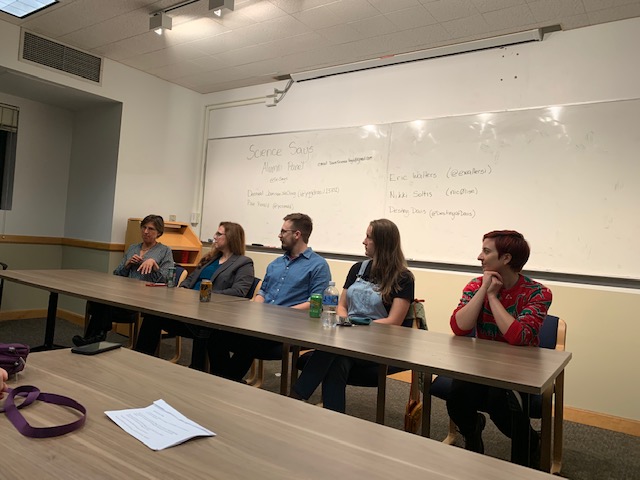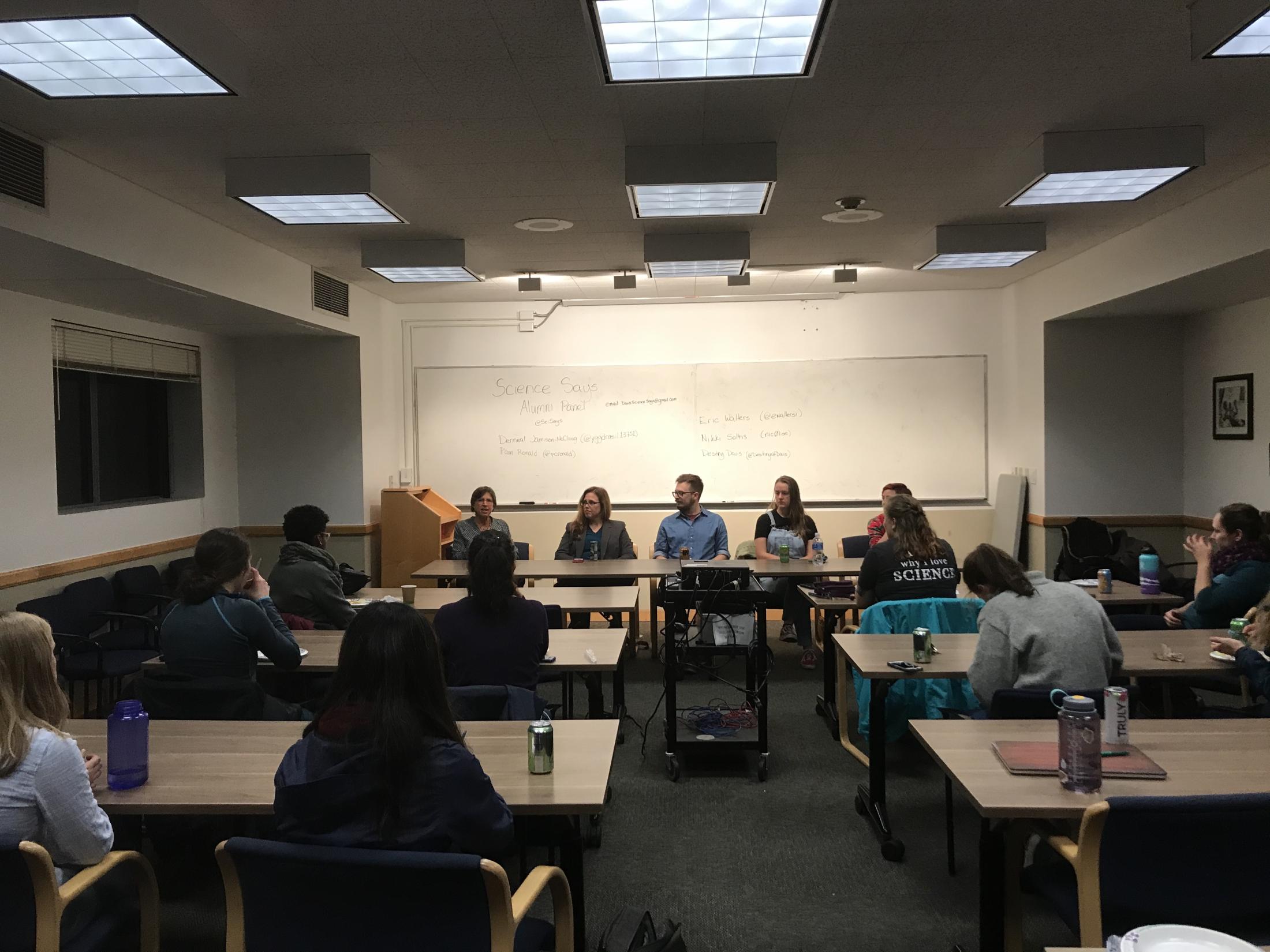
Science Says Alumni Panel
We invited alumni to talk about their careers, experiences, and answer our questions about science communication for our 2019 end-of-the-year event.

Pam Ronald is a distinguished professor in the Department of Plant Pathology and the Genome Center, and serves as the Science Says Faculty Advisor. She is also the founding Faculty Director of the Institute for Food and Agricultural Literacy (IFAL).
Denneal Jamison-McClung is the Director of the Biotechnology Program and helped launch what is now Science Says while serving as the inaugural director of IFAL in 2014.
Eric Walters is a Science Says alumnus, previously serving as a Social Media team member. He is currently an air quality and climate change consultant on the California State Senate Environmental Quality Committee.
Destiny Davis is a Science Says alumna, previously serving as President. She is one quarter away from submitting her thesis and is currently looking for academic postdocs and jobs.
Nicole Soltis is a Science Says alumna, previously serving as President. She is a current California Council on Science and Technology (CCST) fellow.
The conversation has been edited for brevity and clarity.
Describe the difficulties in getting a science communication job after your PhD. What qualifications tend to be required. What opportunities are really helpful in building a resume?
Denneal Jamison-McClung (DJMC): If I was hiring a person to do science communication, I’d want to see your portfolio. Anytime you interview, demonstrating your work with a portfolio is useful. If you go for a professor position, you’d show them your publications or classes you’ve taught. So with scicomm, if you can say here’s my Twitter profile where you can see what and how I post, or here’s my blog, that is useful.
Pam Ronald (PR): I think I met Denneal over Twitter or blogging. I think I the reason I reached out to her to help start this program was because I liked the way she communicated. She had a tone and a level of expertise that I thought was really important and I didn’t want to start off the program with the wrong tone – angry or combative. If you’re interested in a science communication, get out there and do stuff. Have your Twitter feed be really about communicating science to build your reputation.
"One piece of advice I have is to be really broad in what you think a science communication job is and where they are." - Nicole Soltis
Eric Walters (EW): In terms of science policy, I thought it was a very narrow pipeline to get into that world before I did the CCST fellowship. I think if you want to be a PhD scientist and work in legislative branch writing and editing laws, the CCST fellowship does a fantastic job of supercharging you as a job candidate. It is not only useful to be a good scientist; you also need to be able to communicate what it is you’re working on well. I think the portfolio is a good idea. I always made sure to highlight Science Says on my CV. Having concrete examples like “I wrote this blog post” are super useful.
Destiny Davis (DD): What I’ve been seeing as I’m applying to jobs is that it’s good to have demonstrable things you’ve done to show that you’re committed to science communication. If you have this whole list of events and such that you’ve done, it shows a commitment for one year as an example. And you have to put in the work to actually get that science communication practice. I tailor my CV and especially my cover letter to reflect that. Also get on the listserv! All these websites have them including science communication communities like us and CapSciComm. They send out job notices all the time, and I hear of positions I didn’t even think of.
Nicole Soltis (NS): I think one piece of advice I have is to be really broad in what you think a science communication job is and where they are. Initially, when I was interested in that, I was kind of just looking at museums, which are kind of science communication and journalism, but I felt that’s kind of disappearing. So, where do I go? There are tons of people at the university engaged in science communication. Basically every department has people that are invested in communicating to the public or particular stakeholders what research is going on at the university. There’s so many things you can do with a science communication skill set.
"It’s good to have demonstrable things you’ve done to show that you’re committed to science communication. If you have this whole list of events that you’ve done, it shows a commitment. And you have to put in the work to actually get that science communication practice." - Destiny Davis
DJMC: I think Jenna (another Science Says alumna) went from doing her postdoc to working in biotech. She took her science communication skills and is working in something like science marketing. So I think there is a place within the biotech industry where you can take your scicomm skills and use it.
EW: Another Science Says alumna, Sam Tucci, also did the CCST fellowship program. And similar to Jenna, she’s been looking at governmental affairs jobs for some different biotech companies. There is a very consistent, strong interface between businesses and how they are regulated by laws. You need to be able to walk into the company, talk to the scientists and figure out what they’re doing. And then you have to talk to people from the regulators and try to put into terms they understand. And any company that is bigger than a new start-up probably has one person – at least – whose job is to navigate that relationship.
You mention the CCST Fellowship. Can you tell us more about what it is?
EW: CCST was established 30 years ago through legislation as an independent organization within California that could be called upon to provide unbiased research to the legislature. About 10 years ago, they realized the biggest shortcoming with it was they weren’t building relationships between the scientific and policy-making communities. So they started the fellowship program to attract PhDs and CCST found that PhD-level scientists were well suited for this, even in areas that weren’t their own. For example, we had a neuroscientist in my year that was placed on the education committee and another placed on the judiciary committee. The program really likes people who have some communication experience and have gotten out of the bubble of their lab a bit and are able to parse a bunch of information into a very condensed form.
For more information, check out the CCST website. Applications for 2020-2021 are open and due March 1st, 2020.
It's really difficult to talk about a topic, like nutrition, where everyone's an “expert” because everybody eats. What are some of the challenges that you've encountered or strategies that you have for communicating on topics that people have really strong opinions on?
NS: I would suggest that you listen very carefully to who you’re talking to. One of the things I did right at the beginning of my scicomm at Farmer’s Market or something similar, is someone would bring up a topic and I’d be like, “Oh, I know so much about this. Let me spout off the information.” But you don’t actually know what their concerns are or what they think is going on when you go about it like that. So when people reveal where they’re coming from, you have a lot more to go off. You can build off what they know, reinforce what’s true and redirecting as needed.
"I think when people feel like you’re digging your heels in, that’s how they’re going to respond." - Denneal Jamison-McClung
DD: As a plant researcher, the big one that always comes up is GMOs. I did the same thing at first, like, “I’ve read so much about this, here’s what is.” But that never really worked and no one’s mind got changed. So I start by asking questions first to find out what their concerns are and it makes it much more of a conversation. You can see where they’re coming from, and I guarantee you there’s always a common thread and you can reach a common ground. You’re not going to change everyone’s mind, either. And when you realize that, just stop.
DJMC: If you’re doing some of the broader outreach stuff, they say to aim for the “movable middle”. There’s that middle group of people who don’t know what to think and are looking for information. Try to educate those people and try not to be judgemental. I think when I was younger and first starting scicomm, I did a lot of “Well, you’re really dumb, so let me help you out.” That set a bad tone and I got nowhere. So I ask questions and listen to see where they’re coming from and try not to make them feel like I’m judging them. I’ll say, “Well I understand your concern. And I would be concerned too if I believed X, Y, Z.” And that gives you an opening to say why you aren’t concerned because of the science. You can end the conversation with “I hope that helped.” I think when people feel like you’re digging your heels in, that’s how they’re going to respond.
EW: Anything you can do to build trust is helpful. Alison Van Eenennaam always talks about her kids and what she feeds them when she talks to people about GMOs. And they can relate to that – yeah, I have these little humans to feed too. Finding that common ground is important.
How do you gauge whether or not you were successful in your communication?
PR: It is hard to gauge. There’s a little bit of blind faith. I’m absolutely sure that all of you have already made a difference, whether talking only to your family or to kids. Just keep going and don’t take things personally when you get into a difficult conversation. You have to be patient and believe that it does matter. I feel like if you want to move the world ahead, you can’t fight every issue, but in our own sphere we can take small steps to make a difference.
DJMC: Also, when you’re in these interactions where you feel like you’ve lost the person, it’s important to take a step back. Even if they don’t understand the scientific bits, they understand your demeanor. It’s really all you can do.

EW: I really liked the line about blind faith. Colin Murphy also has this “garbage can” theory on changing someone’s opinion. People in decision making positions throw all the information they receive over the day into the same can. Sometime later when they’re asked something about what they learned that day or for their opinion, they pull something out of that garbage can and it’s got all the juices on it from the other things in there. You don’t know what else has been thrown in there or what they’ll make connection between. You try to put in what you can.
I work at the California Primate Center, and part of my job is to work with scientists there to share their work with the public. How do you cope with and handle colleagues and superiors who don't want to communicate their science, or who don't believe in science communication?
PR: Some people don’t want to do it because it takes time and they just really want to do their research, and I respect that. Other times they’re scared because they work on sensitive topics and have seen their colleagues get harassed. I think, also, if you can share what you’ve written about their colleague to demonstrate your experience and style, that can make a difference.
DJMC: I think they may have been harassed so severely out there, it’s a very sensitive situation. I work with Jan Nolta’s group at the UCD Med Center. They work with STEM cells and mouse models, but they don’t want us to talk very much about the mouse colony. And that’s because of the sensitivity around animal research and some activists can be extreme and dangerous.
Do you have any helpful hints of how we can, in a sense, dumb down our science but also communicate it well enough for the general public to understand as well fellow scientists?
PR: Practice and external readers. Getting external readers that are outside your field is really nice. You’d be surprised at how opaque the topic is to them.
NS: One thing that really helps me is editing other people’s work. When you do your own writing, you are also editing it as you go along. Externalizing the editing process and bringing it back to your own writing can be effective.
EW: I think picking your battles is important too. Not every piece of writing that you put out is going to be accessible.
"Consider thinking of your audience as infinitely ignorant but infinitely intelligent. They don’t know anything coming in, but if you teach them once they will learn." - Eric Walters
DD: I also would think about your audience. You’re not necessarily going to write the same way for a blog post as you would for an op-ed in a journal or newspaper. That informs you how much detail you go into. When I first started writing, I really loved some of the details. But sometimes you have to take out your favorite paragraph to make the whole piece more clear. Practice and having people outside your field read it is also the most useful tip. If I hand my piece to a roommate and they don’t know something, I can either take that part out or explain it. Another fun tool is the Up-Goer Five editor. It only allows you to use the top 1,000 words to explain your thesis, for example.
Tweet your Up-Goer Five results to us with #JargonFreeScience!
DJMC: Generally speaking, they say that you should aim your writing and vocabulary to be at a sixth grade level when communicating to policy makers or nonscientists. Like what vocabulary is used on a daily basis?
NS: You have to be so selective on jargon use. You can pick one or two that are really core to topic, but you have to explain it really well and keep coming back to it. Otherwise you can probably do without it.
EW: Consider thinking of your audience as infinitely ignorant but infinitely intelligent. They don’t know anything coming in, but if you teach them once they will learn.
Revisiting science communication careers, some of you mentioned that science communication may end up being a side project. How do you balance your actual job and then your passion for science communication on the side?
DJMC: There is no balance. If you look at when I’m tweeting things, it’s at very odd hours. I also weave it through my day, like when I’m standing in line at the coffee kiosk.
PR: It’ll change through your career. I went through an intense time writing a book and writing blogs, and then I discovered Twitter. So 140 characters to do science communication instead of a whole book seems kinda nice. I do miss doing longer pieces, but it’s just not working right now. I think just remember your life is hopefully long and that you’re going to be more science communication sometimes and less at other times. You might get bored with one medium and try something else, too.
DD: It’s not always easy finding balance. At first my science communication was pretty heavy because my research was terrible at the time. But then you find your stride in both and get to a maintainable balance.
"It’ll change through your career. I went through an intense time writing a book and writing blogs, and then I discovered Twitter. So 140 characters to do science communication instead of a whole book seems kinda nice." - Pam Ronald
Getting my PI on my side took time and effort, but it helped and when she’s writing grants she comes to me and asks what broader impacts I have. And I can tell her that I’ve been to these events and have pictures, and that I’ve written these pieces. For the next step I don’t want to stop doing science communication, so for the academic jobs I’m applying for I’m being upfront about wanting to build it into my position. So far all the professors I’ve talked with are more than excited.
NS: As a hobby, science communication will ebb and flow. The level I was participating at depended on what was happening in my research. Being okay with that and knowing you’ll come back to it when you have time and energy is really helpful.
EW: I find that just random conversations with friends and family during those times where I can’t do formal science communication is sometimes the most fulfilling. And you don’t have to pencil that into your calendar.
Thank you to the panelists for sharing their insight with us.
Sydney Wyatt is a PhD student at the University of California in Davis. For more content from the UC Davis science communication group "Science Says", follow us on twitter @SciSays.

Comments